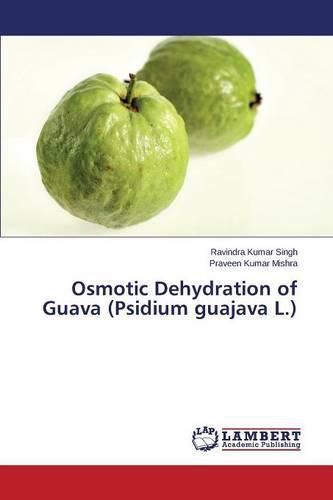Readings Newsletter
Become a Readings Member to make your shopping experience even easier.
Sign in or sign up for free!
You’re not far away from qualifying for FREE standard shipping within Australia
You’ve qualified for FREE standard shipping within Australia
The cart is loading…






This title is printed to order. This book may have been self-published. If so, we cannot guarantee the quality of the content. In the main most books will have gone through the editing process however some may not. We therefore suggest that you be aware of this before ordering this book. If in doubt check either the author or publisher’s details as we are unable to accept any returns unless they are faulty. Please contact us if you have any questions.
In first experiment, physico-chemical characteristics of guava fruit was studied, in second experiment different soaking treatments were evaluated for preparation of guava candy. Results of present studies indicated that guava fruit of cultivar Lucknow-49 had 164.8 g average fruit weight, 1.64 per cent seed content and 98.36 per cent pulp, 6.6 cm length and 6.4 cm width. Guava fruit of cultivar Lucknow- 49 was found to contain 10.23 per cent TSS, 0.51 per cent acidity, 169.5 mg per 100g ascorbic acid, 3.40 per cent reducing sugars, 3.59 per cent non reducing sugar, 6.99 per cent total sugars and 278 mg per 100 g total phenols. Among different soaking treatments 0.5 per cent sodium metabisulphite treatment was found best on the basis of quality, storage life and cost: benefit ratio. Candy prepared with this treatment maintained its original rating, i.e. Like very much up to six months of storage and the cost: benefit ratio of candy prepared with this treatment was found 1:1.7
$9.00 standard shipping within Australia
FREE standard shipping within Australia for orders over $100.00
Express & International shipping calculated at checkout
This title is printed to order. This book may have been self-published. If so, we cannot guarantee the quality of the content. In the main most books will have gone through the editing process however some may not. We therefore suggest that you be aware of this before ordering this book. If in doubt check either the author or publisher’s details as we are unable to accept any returns unless they are faulty. Please contact us if you have any questions.
In first experiment, physico-chemical characteristics of guava fruit was studied, in second experiment different soaking treatments were evaluated for preparation of guava candy. Results of present studies indicated that guava fruit of cultivar Lucknow-49 had 164.8 g average fruit weight, 1.64 per cent seed content and 98.36 per cent pulp, 6.6 cm length and 6.4 cm width. Guava fruit of cultivar Lucknow- 49 was found to contain 10.23 per cent TSS, 0.51 per cent acidity, 169.5 mg per 100g ascorbic acid, 3.40 per cent reducing sugars, 3.59 per cent non reducing sugar, 6.99 per cent total sugars and 278 mg per 100 g total phenols. Among different soaking treatments 0.5 per cent sodium metabisulphite treatment was found best on the basis of quality, storage life and cost: benefit ratio. Candy prepared with this treatment maintained its original rating, i.e. Like very much up to six months of storage and the cost: benefit ratio of candy prepared with this treatment was found 1:1.7